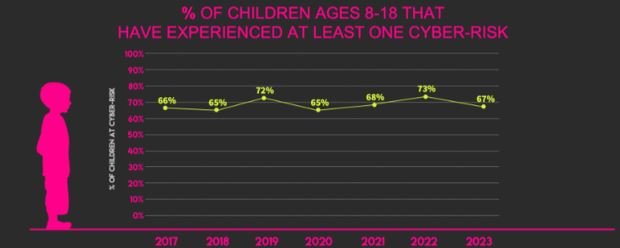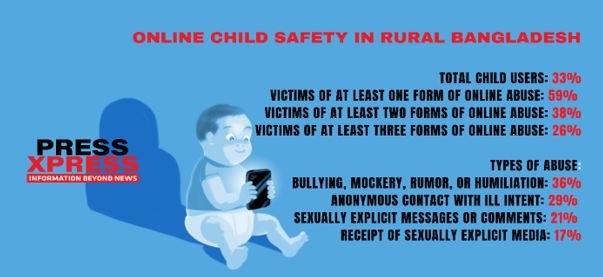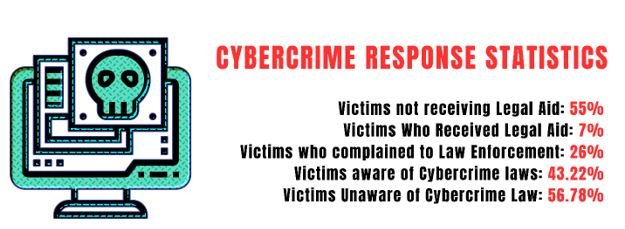With the rise of nationwide political strikes and blockades leading to school closures, children from various backgrounds find themselves immersed in online classes, equipped with phones and unrestricted internet access. While the convenience of virtual education is undeniable, the lack of parental monitoring exposes children to potential online threats.
The internet, an expansive realm, exposes children to various dangers, often without them grasping the gravity of the situation. The alarming prevalence of explicit content, particularly pornography, poses a significant risk to their mental and emotional well-being.
The Shadow of Cyber Exploitation
There is a long-standing concern about children stumbling upon inappropriate content. The consequences of these exposures are not only limited to the psychological impact on children but extend to the creation of histrionic personalities and the potential for them to become victims of exploitative situations.
A global Problem

“Cyber Pandemic” is a report concerning the safety of children online; created by the international think tank DQ Institute. The report has created what it calls the “Child Online Safety Index”. According to a survey DQ Institute, almost two-thirds (60%) of children aged 8-12 surveyed across 30 countries are exposed to one or more forms of cyber risk. Bangladesh is mentioned in the report.
The Business of Exploitation
Research by child protection specialist Shabnaaz Zahereen reveals the dark underbelly of child exploitation online, turning child pornography and live sexual abuse materials into a lucrative million-dollar business. The allure of financial incentives drives some young individuals to engage in explicit content creation, perpetuating harmful stereotypes and contributing to the degradation and humiliation of women. The Situation in Rural Bangladesh.

In a recent study conducted by Bangabandhu Sheikh Mujib Medical University (BSMMU), shocking statistics have emerged, shedding light on the challenges faced by children who use the internet in rural areas of Bangladesh. The study highlights that approximately 33% of children aged 11-17 in these regions are active internet users.
The study indicates that a staggering 59% of these youngsters have fallen victim to at least one form of online abuse. This prevalence sets the stage for a closer examination of the challenges faced by these young users in the online sphere.
Disturbing Trends Unveiled
The research findings, presented on November 17, 2022, at BSMMU, paint a troubling picture. Among the internet-active youth, a significant 38% reported experiencing at least two forms of cyber abuse. Even more alarming is the revelation that 26% of these youngsters have endured a distressing minimum of three incidents of online abuse.
The study identifies several prevalent cyber abuses plaguing the lives of these young internet users. These include Bullying, Mockery, Rumor, or Humiliation (36%), Anonymous Contact with Ill Intent (29%), Sexually Explicit Messages or Comments (21%), and Receipt of Sexually Explicit Media (17%).
Legislative Reforms and Further Empowering Law Enforcement
The inadequate legal provisions, exemplified by the Digital Security Act of 2018, fail to address issues such as pedophilia, leaving children unprotected in the digital realm. The limited awareness among parents and the inability to address online child protection concerns further exacerbate the situation.
Urgent action is needed to bridge the legislative gaps and enhance the enforcement capabilities of cybercrime tribunals. Awareness campaigns should be either sponsored by the government or initiated by the government itself to inform parents and children alike of the dangers of cyberspace.

A Separate, broader survey on cybercrime on the whole found that only 55% of Cybercrime victims do not receive the necessary aid they deserve. This is crucial as online child protection measures will fall under the purview of cybercrime laws and enforcement agencies.
Harmonizing existing laws, such as The Children Act, 2013, ICT Act, 2006, Digital Security Act,2018 and The Pornography Control Act, 2012, is essential to address the evolving landscape of online threats. Specific provisions regarding online violence against children must be incorporated to enhance legal frameworks.
Law enforcement agencies must undergo capacity development to collect digital evidence and handle cases involving children with sensitivity. Cybercrime tribunals should play a pivotal role in addressing online child harassment cases swiftly and effectively.
At present, the number of cyber tribunals stands at six; this number needs to be drastically expanded, preferably at the district level. District-level cybercrime prevention and monitoring cells should be established in order to provide victims with easy access to aid. In a nation that is trying to promote the concept of “Digital Bangladesh, it is crucial that the legal and law enforcement framework keeps pace with the rapid development of digitization and proliferation of the internet.
The Urgent Need for Monitoring
Advocate Salma emphasizes the necessity of a comprehensive monitoring system for children across privileged and underprivileged backgrounds. The lack of effective enforcement of legislation, coupled with the limited capabilities of cybercrime prevention units, leaves children vulnerable to online exploitation.
Parental Responsibility and Empowerment
The lack of awareness among parents and children exacerbates the rise in online child protection concerns. To address this, parents are encouraged to actively engage with their children online, develop digital intelligence, and instill good habits. The responsibility lies not only with legislators but also with parents to create a safe online environment for children.
Striking a balance between the positive aspects of the cyber world and safeguarding children from abuse is crucial. Ensuring children’s rights to privacy, information, expression, and association should be prioritized, transforming the internet into an empowering experience for children.
Toward a Safer Smart Bangladesh: A Multi-Sectoral Response
As we confront the challenges of child safety online, a multi-sectoral response becomes imperative. The government must take the lead in developing and implementing policies on awareness raising, rehabilitation services, and industry accountability. The collaboration of the ICT industry, law enforcement agencies, and the legal system is crucial to creating a harmonized approach to prevent online violence against children. The dream of “digital Bangladesh” requires that both infrastructure development as well as social awareness grow in parallel. Legal and law enforcement adaption to the ever-changing scene of cyberspace is crucial to ensure citizen security. In order to ensure that our children have a safe and secure digital landscape to flourish in, timely steps regarding digital security, access to information and law enforcement services, monitoring and awareness need to be implanted.


